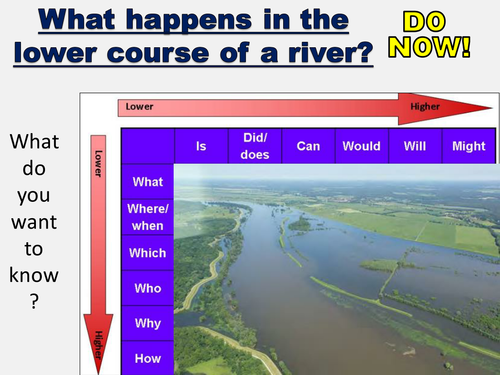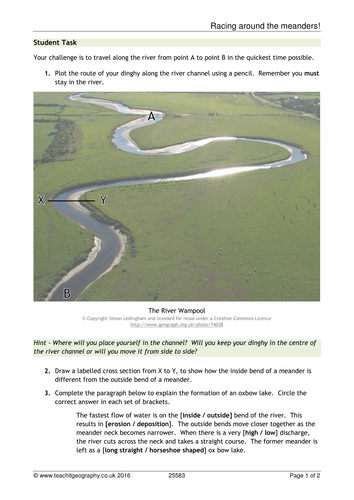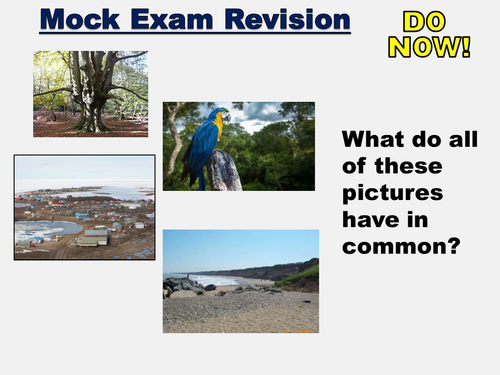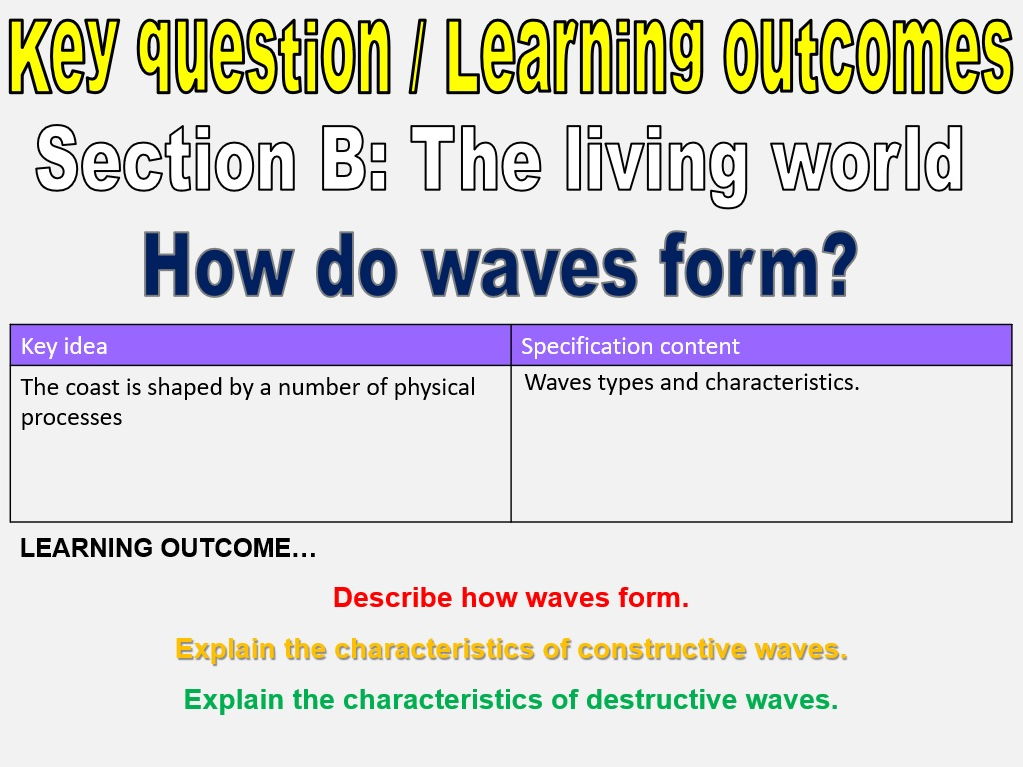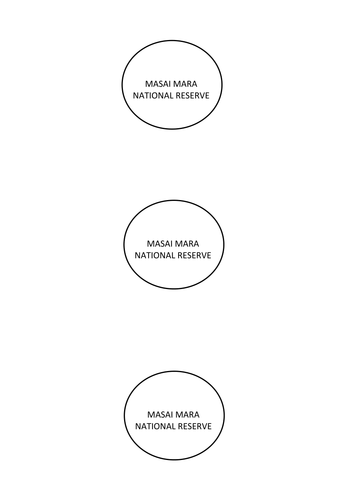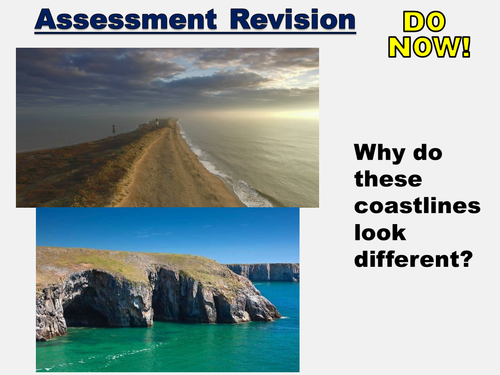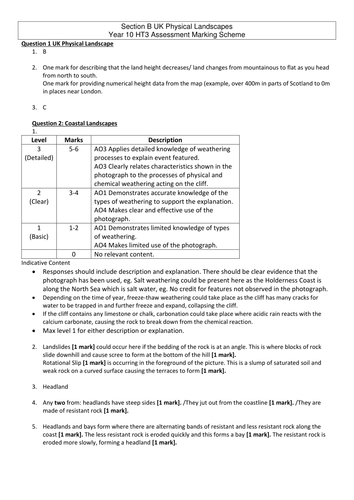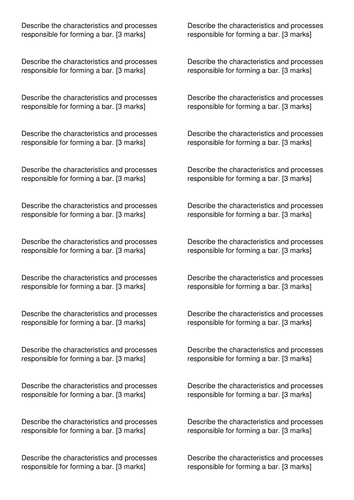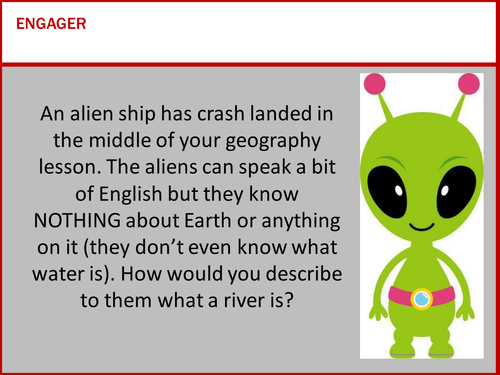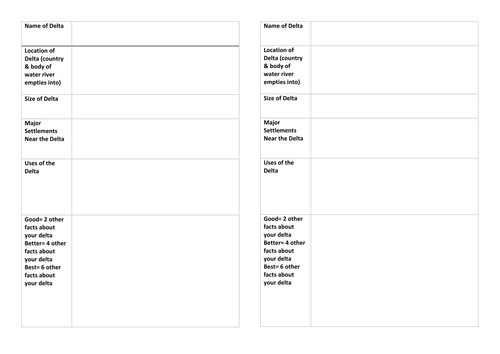
67Uploads
14k+Views
3k+Downloads
All resources

New AQA GCSE Geography- River Landscapes in the UK lesson #4
This is the fourth lesson in a series on rivers for the new AQA GCSE specification. This lesson covers the processes and features that occurs in the lower course of a river. This includes processes of deposition and the creation of estuaries, floodplains and levees.

New AQA GCSE - River Landscapes in the UK Lesson #3
This is the third lesson in a series on Rivers for the new AQA GCSE Geography specification. This lesson covers the processes and features formed in the middle course of a river including transportation, meanders and oxbow lakes.

New AQA GCSE Living in the physical environment- Exam revision prep
This is a powerpoint and collection of revision mind maps for each of the units covered in the new AQA GCSE Living in the physical environment spec.
The revision mind maps cover:
-Ecosystems
-Tropical Rainforests
-Cold Environments
-Coasts
Each mind map is divided into topics covered in the spec and has a practice exam question on the back for each topic.
These are excellent resources to use if preparing for a mock exam.
Bundle

New AQA GCSE Coasts Full Unit
This bundle consists of 6 lessons and an assessment on coasts for the new AQA GCSE specification. Created and taught between Jan-Feb 2017.

New AQA GCSE Geography- River landscapes in the UK lesson #2
This is the second lesson in a series on river landscapes in the UK for the new AQA GCSE geography specification. This lesson goes over the processes and features that occur in the upper course of a river. If this unit is taught after coasts then this reviews their knowledge of erosional processes. This lesson looks at how erosion plays a role in the forming of truncated spurs, waterfalls and gorges and includes differentiated activities.

New AQA GCSE Geography- River landscapes in the UK Lesson #1
This is the first lesson in a series on river landscapes in the UK as part of the new AQA GCSE specification. This lesson introduces students to river basins and the long profile of a river by creating a pop up river basin for their books. This lesson also includes a local case study to consolidate their knowledge of river basins and their features. This can be easily adapted for schools to create their own local case study. This lesson also features differentiated activities and worksheets.

KS3 Africa Case Study- Masai Mara Assessment
This is the preparation and the assessment for a case study on the Masai Mara National Reserve in Kenya. Students will be creating a brochure that informs people on what is happening in the Masai Mara- where it is located, the species that live in it, what problems tourism is having, how people can be a good tourist, and how other national parks can learn from the Masai Mara. Along with the assessment instructions there are resources for creating the brochure for both high and low abilities.

New AQA GCSE UK Physical Environment- Coasts Lesson 5.5 Assessment Prep
This is a lesson designed to review what students have done in their coasts unit up until depositional features. This lessons works very well when you put a time limit on how long they have to work on each section and you can follow up each section with a Q&A session to check for understanding.

New AQA GCSE UK Physical Landscape- Coasts Assessment
This is an exam-style assessment for the Coasts unit as part of the new AQA GCSE geography specification. This assessment covers information on weathering and mass movement, types of waves, coastal processes and coastal features.
Bundle

KS3 Rivers Processes and Features
This bundle contains all of the lessons for a KS3 unit on Rivers that goes over the processes and features for the upper, middle and lower course.
The lessons start with an overview of the water cycle to introduce students to how rivers form. It then covers the upper course processes (erosion), features (waterfalls, gorges), middle course processes (transportation), features (meanders), lower course processes (deposition), features (oxbow lakes, deltas), and also includes an assessment designed as a mid-unit assessment to go over what has been learned so far.
Excellent hands-on activities and can easily be adapted for GCSE!

KS3 Africa Case Study- Population Density and Distribution of Kenya
This lesson is an additional lesson to begin a case study unit looking at the Masai Mara National Reserve in Kenya. Students use their knowledge of population and learn how to read choropleth maps to understand which areas in Kenya are the most and least populated and can determine the best place for a national park.

KS3 Africa Case Study- Tourism in the Masai Mara National Reserve
This is the second lesson in a series for a case study on the Masai Mara National Reserve. This lesson goes over the good, the bad, and the ugly of tourism in the Masai Mara National reserve. Students will analyse the benefits and consequences of tourism.

KS3 Africa Case Study- Introduction to the Masai Mara National Reserve
This is an introduction to the location, climate and plants and animals found within the Masai Mara National Reserve. This can be done as a case study for a KS3 Africa Unit.

New AQA GCSE UK Physical Landscapes- Coasts Lesson #5
This is the fifth lesson in a series on Coasts for the new AQA physical geography specification. This lesson covers depositional features and reviews the process of longshore drift.

KS3 Rivers Lesson #7- River Land Use
This lesson introduces how humans use rivers for different purposes. They are also introduced to the idea of land use conflict. This lesson focuses around local rivers near my school but can be easily adapted to use other local rivers.

KS3 Rivers Lesson #6.5- Mid Unit Assessment
This is an assessment that covers everything from the rivers unit from the water cycle to the processes and features in the upper, middle, and lower courses of the river. It also includes revision, feedback sheet, marking scheme and assessment paper.

KS3 Rivers Lesson #6- Lower Course Processes and Features
This lesson looks into the depositional features created in the lower course of a river. It focuses on oxbow lakes and deltas.
There is also a second powerpoint which provides an option of turning the lesson into an ICT lesson if you have access to ICT resources.

KS3 Rivers Lesson #5- Middle Course Processes and Features
This lesson covers the transportation processes that occur in the Middle course and looks at the formation of meanders.
For this lesson there is a hands on activity that requires students to look at 3 different sized "particles" that they have to determine how they move. I used balloons, small tennis balls and balls of play-doh all acquired from the pound shop. You could also use other materials.
Students also complete this task while listening to the song Proud Mary because, well, rolling on the river.
Enjoy the pun!

KS3 Rivers Lesson #4- Upper Course Features
This lesson goes over the features that form in the upper course of a river caused by erosion.

KS3 Rivers Lesson #3- Upper course processes FOR NO ACCESS TO LAB RESOURCES
If you do not have access to lab resources (see other lesson for what is needed), then this lesson introduces the erosional processes that occur in the upper course of a river.

